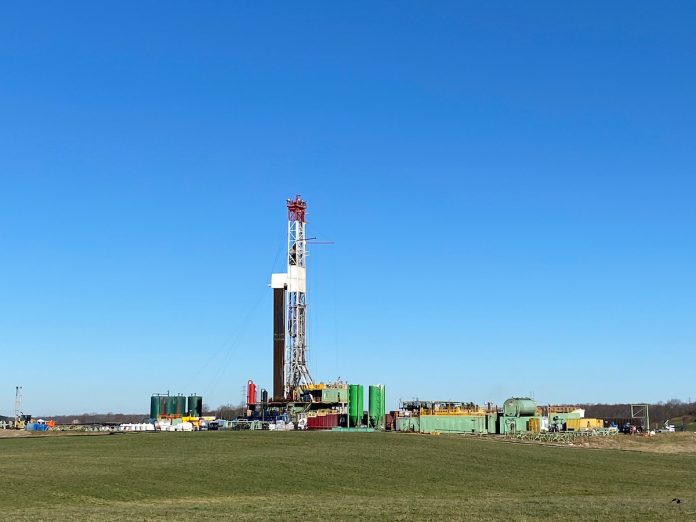SALEM, Ohio — West Virginia could become the fourth state to be able to permit its own Class VI wells, used to store carbon in the ground. This would expedite the approval process which currently takes place at the federal level.
The move will open up the state to carbon capture and sequestration, something that hasn’t been done in the state but is critical to the proposed ARCH2 hydrogen hub that’s supposed to bring thousands of jobs to the region.
West Virginia applied for primacy over Class VI wells in the spring and the U.S. EPA recently set a public hearing for Dec. 30 on the proposed rule change.
Community groups and environmental activists raised concerns over the timing of the public comment period, saying the EPA is fast-tracking the rule change and limiting public involvement.
“Fast-tracking West Virginia’s primacy application is a recipe for disaster,” said Eric Engle, president of Mid-Ohio Valley Climate Action. “Delegating oversight means rushed permits, weakened reviews, and cutting communities out of the decision-making process. Expediency should never come at the expense of safety and public trust. The people of West Virginia deserve better.”
What is Class VI well primacy?
West Virginia applied for Class VI primacy on May 1, which will allow the West Virginia Department of Environmental Protection to approve Class VI wells under the state’s Safe Drinking Water Act Underground Injection Control program.
The federal EPA typically approves Class VI wells, however, the process of approving wells at the state level is much faster, as the agency is responsible for reviewing applications nationwide. Only three states have primacy for Class VI wells including Wyoming, North Dakota and Louisiana.
Class VI wells, used for carbon capture and sequestration, will play a significant role in the Appalachian Clean Regional Hydrogen Hub, known as ARCH 2. The project will produce “clean” hydrogen using natural gas and will span the tri-state area of West Virginia, Ohio and Pennsylvania.
These wells store carbon in the ground to reduce emissions, a critical part of the ARCH 2 project’s goal to be an environmentally friendly energy source. However, environmental activists say there’s been little research on CCS to prove its effectiveness and research that has been done shows significant problems.
According to EPA data, there are only nine active Class VI wells in the United States, most of which are in North Dakota. Only two wells are in the injection phase.
There are three proposals for Class VI wells in Hancock and Mason County in West Virginia and one proposed well in Lorian County in Ohio.
Environmental activist letter
In reaction to the public hearing announcement, Ohio River Valley Institute hydrogen program coordinator Tom Torres wrote a letter to the EPA, saying the process has been fast-tracked compared to other states that have applied for Class VI well primacy in the past.
The application review process took much longer for other states and the public comment periods were open for longer, the letter stated.
North Dakota and Louisiana residents received two public comment periods totaling 90 days. Wyoming residents were given 45 days to comment. West Virginia residents are being given 34 days to review over 800 pages of documents about the rule change.
The EPA announced the rule change a day before Thanksgiving, on Nov. 27. The public comment period began on Nov. 27 and will close on Dec. 30.
“By opening a comment period spanning most of the window between the Thanksgiving and New Year’s holidays, EPA chose to issue its proposal at a profoundly inconvenient time for the public,” the letter said.
The letter also points out contradictions in the EPA’s previously stated goals for “inclusive public participation” during the primacy application process including “scheduling public meetings at times convenient for residents.”
It finishes by saying the EPA’s actions fall in line with the state of West Virginia’s approach to speeding up the approval of projects and seeming disinterest in public involvement, noting the lack of public involvement in the ARCH 2 project.
In a recent press statement by environmental organizations, groups like West Virginia Citizen Action, the West Virginia Chapter of the Sierra Club, West Virginia Rivers, ORVI and Mid-Ohio Valley Climate Action asked the EPA to extend the public comment period to at least 60 days and to reschedule the public hearing.
“West Virginia regulators have failed to demonstrate they can safely manage this experimental technology. Class VI wells, still largely untested in the US, involve complex geological processes and high risks, including groundwater contamination and seismic activity. These are precisely the types of operations that demand stringent federal oversight,” said Autumn Crowe of West Virginia Rivers. “The EPA’s decision to expedite this process during the holidays is a grievous error and one that fails West Virginia communities.”
The EPA responded to Torres’ letter on Dec. 13 which stated the agency made a pre-publication version of the proposed rule change available to the public in the Federal Register Notice on Nov. 22. This has given the public 38 days to view the rule change, instead of 34 days to view and write comments.
The agency added the state of West Virginia previously held several public participation events on Class VI wells regulations: a 30-day comment period and public hearing in 2021 and a 36-day comment period and public hearing last year. Therefore, the public comment period and public hearing are “appropriate, offering a meaningful opportunity for public comment.”
The public hearing is scheduled for Dec. 30 from 9:30-11:30 a.m., noon to 2 p.m., 2:30-4 p.m. and 5-7 p.m. at the Charleston Marriott Town Center, 200 Lee St. E, Charleston, West Virginia, and will also take place over Zoom. The EPA is taking public comments online, through the mail and hand-delivery.
Interested parties can attend the public hearing virtually by clicking https://www.zoomgov.com/j/1600637199 and can submit comments at https://www.regulations.gov.
(Liz Partsch can be reached at epartsch@farmanddairy.com or 330-337-3419.)










